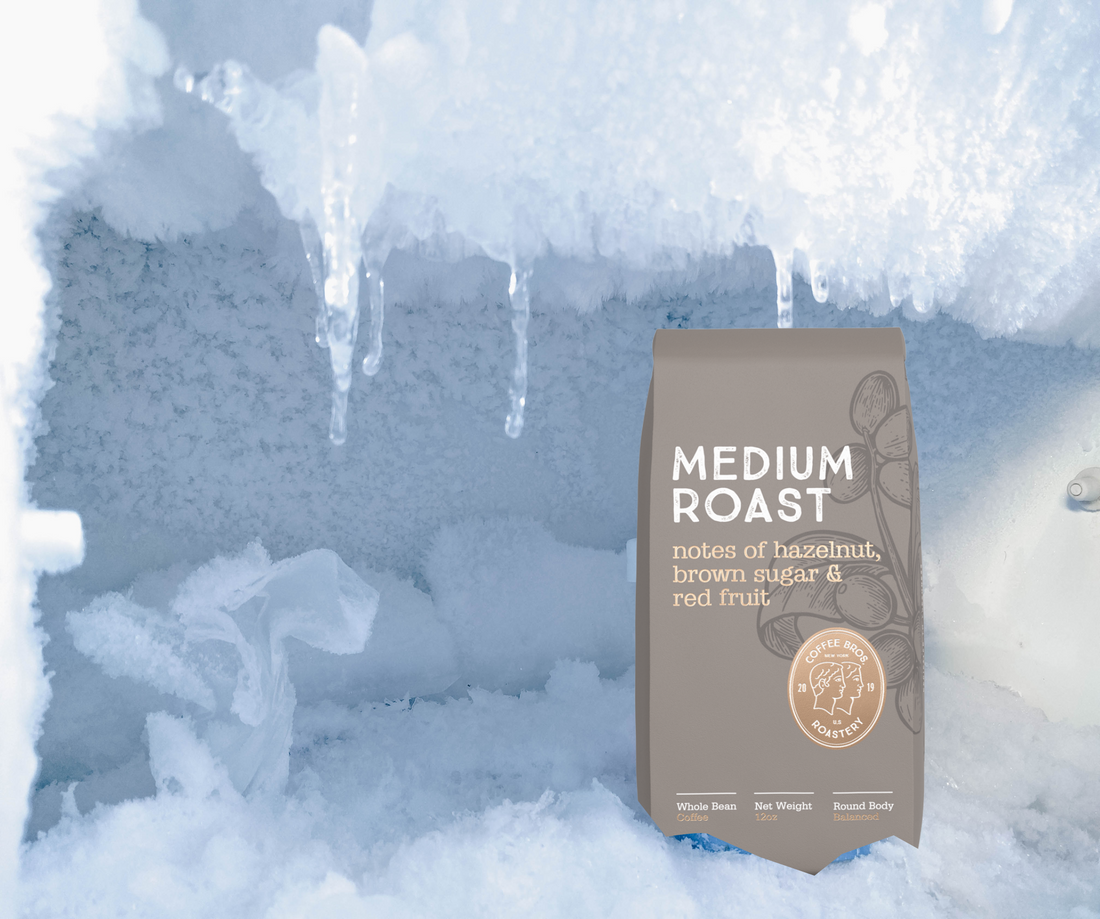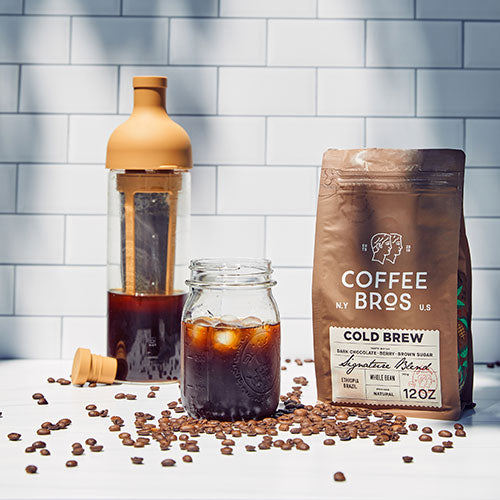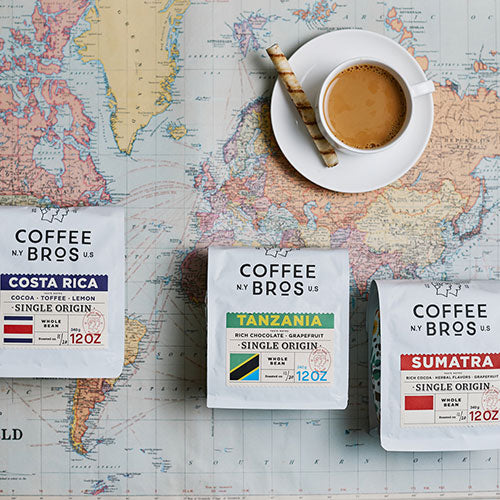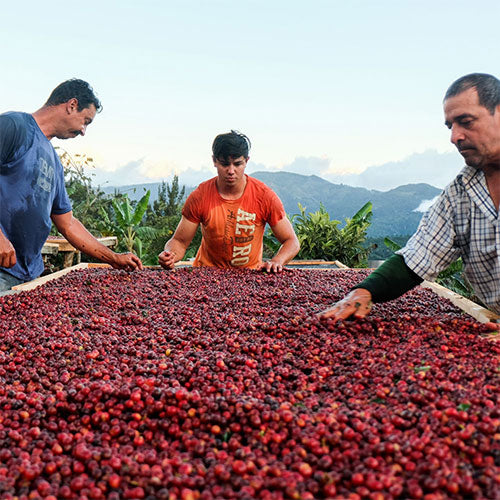“If you store your coffee beans in the freezer, you're a lunatic!”... said basically every coffee pro ever. And amazingly, they were wrong. You can freeze coffee beans to keep them fresh for longer, but there's a really specific way it must be done.
If you fail to follow the ‘trick', your coffee will taste dull and lifeless (just like the coffee elitists foretold). But don't worry—you're about to get exact instructions on how you can freeze your coffee the right way.
We'll cover…
- Why most people get freezing coffee wrong (including the pros)
- The ONE thing you cannot do, or you'll ruin your coffee
- How to freeze your coffee beans according to science
Say goodbye to beans that went stale because you couldn't drink them fast enough.
How Not To Freeze Your Coffee Beans
When you think about how most people freeze their coffee, it makes sense why the coffee industry waged an intense campaign against the practice. The common method was, well, really, really bad.
Read: How To Store Coffee Beans To Maximize Flavor
You'd open up your bag or can of Folger's, scoop some grounds into your coffee pot, pop the lid back on, and stick the whole thing back in the freezer. This was an insta-kill on the flavor, and coffee pros were right to go mad about it.
Here's why.
Putting coffee in the freezer makes the moisture levels of the beans get all out of whack.
More scientifically, coffee beans are “dry goods”, or very low on moisture. When you put them in the freezer, they naturally start soaking up all the moisture in the freezer—and there can be lot of it if you are not careful! Just to be clear, freezers are generally dry places but the more frequently you open the door, you let in humid air which can create moisture build up. To prevent excessive moisture buildup, reduce the number of times you open the door. Retrieve all the items you need at once, and seel your coffee in an airtight container.
Oh, and all those aromas in the freezer? They're getting soaked up into the beans too.
(If you've never tried leftover chicken enchilada coffee, you need to get on that.)
The humidity causes the beans (or grounds) to break down extra quickly, leading to hundreds of slow chemical reactions. The flavor gets muddy, sad, and tastes “off”.
Even if you wait to open the can of coffee until it's out of the freezer, the rapid change in temperature and pressure will cause condensation to instantly form on the beans—so you can't avoid the main problem (but you can avoid leftover-tasting coffee).
There's Only One Way To Freeze Coffee Beans Correctly
Amazingly, we have some new, shiny science that says there is a good way to store coffee in the freezer—it's just a really specific way.
Here's what to do:
- Step 1: Find an air-tight container (or a few). Lots of tupperware still lets small amounts of air in, but we need this to be completely tight, so get your best zipper bag or container and stick your beans in there. Bonus points if it can be vacuum sealed! Original coffee bags, because of the ‘degassing valve', do not work.
- Step 2: Divide coffee into small batches. The goal is to pull out just enough coffee for 3-6 days without disturbing the rest. So storing multiple smaller batches is bigger than one big batch.
- Step 3: Put it all in the freezer. I think you know how this part works.
- Step 4: Important—when you take the coffee out of the freezer, don't open it! You must let your beans completely thaw to room temperature before you open the bag/container. Otherwise, you'll get that rush of air and moisture… and all your hard work will be for nothing.
Yes, It works! And high-up people in the coffee industry know it.
“I decided to try it myself and found that immediate freezing after roasting to be the single most effective method of delaying spoilage, hands-down. I now store coffees in a dedicated coffee chest freezer for sometimes as long as a year after roasting without significant degradation.”
— Andrew Hetzel, Specialty Coffee Association of America Board Member
But there is a downside: coffee beans that were frozen don't have a long shelf-life. Instead of a normal 2-3 week period of peak freshness and flavor, beans that were frozen have only 5-6 days before they start going downhill quickly. That's why it's best to freeze in small batches.
Two Times When Freezing Coffee Is A Great Idea
Now, buying freshly-roasted coffee beans is almost always the best way to buy coffee. But now that you know the right way to freeze coffee without destroying its flavor, there are actually some great ways to take advantage of it.
- When you have more coffee than you can drink soon. You get gifts, you buy extra bags on vacation—whatever the reason, if you end up with more coffee than you can drink in 2-3 weeks, just freeze the extra. It'll be there when you're ready for it.
- When you buy a high-dollar coffee and want to savor it. So you buy a fancy bag of rare coffee—amazing. But you don't want to drink all of it in a short amount of time. You want to save some for your friends and family to try over the next few months. Freezing small batches is a great way to preserve the flavor and quality and make those good moments last longer.
Freezing coffee solves some real problems with storage—as long as you do it the right way!
Of course, if you usually buy low-grade, stale coffee beans (aka, grocery store beans), freezing won't really help you. Freezing only saves flavor that's already there—and if it's bad flavor… well, that's just sad.
You should try specialty coffee instead.
With tasting notes like honey, strawberry, maple, and red fruit, you can't go wrong with freshly-roasted, specialty-grade coffee beans.
(Your morning will be so much happier!)




